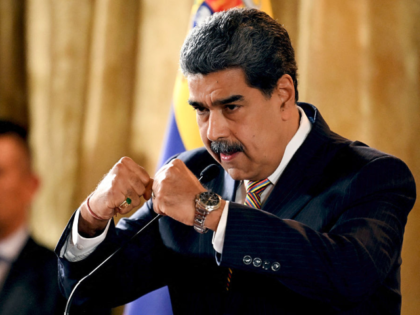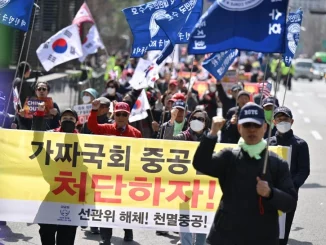
Published September 13, 2025
Socialist dictator of Venezuela Nicolás Maduro on Thursday called upon members of the United Socialist Party of Venezuela (PSUV) to prepare for an “armed resistance” and defend the country against the “military threats from the United States.”
Venezuelan President Nicolás Maduro has escalated his rhetoric amid heightened tensions with the United States, calling on Venezuelans to prepare for “armed resistance” against what he describes as U.S. military aggression. This call comes in response to recent U.S. military activities in the Caribbean, including the deployment of naval forces and fighter jets, which Washington asserts are aimed at combating drug trafficking. Maduro, however, contends that these actions are a pretext for regime change and a direct threat to Venezuela’s sovereignty.
National Mobilization and Military Readiness
In a broadcasted address to the United Socialist Party of Venezuela (PSUV), Maduro urged members to engage in strategic discussions about transitioning to an “armed struggle” if the country faces military aggression. He emphasized the need for grassroots mobilization and national defense preparedness, framing the situation as a defense of Venezuela’s dignity and sovereignty .
The Venezuelan government has activated 284 “battlefronts” across the nation, deploying military, police, and civilian defense forces in response to the U.S. presence in the region. This includes the stationing of 25,000 troops near the Colombian border, an area identified as a hotspot for drug trafficking.
AI-Driven Nationalist Campaigns
To bolster public support, the Maduro administration has launched the “Yo Me Alisto” (“I am ready”) campaign, utilizing artificial intelligence to generate messages from historical Venezuelan figures like Simón Bolívar and José Gregorio Hernández. These AI-generated avatars are used to encourage civilian participation in local militias. While the campaign aims to foster national unity, it has faced criticism, particularly from religious leaders, who argue that the inclusion of Hernández, a revered pacifist, misrepresents his legacy .
Diplomatic Tensions and Calls for Dialogue
Despite his combative stance, Maduro has expressed a willingness to engage in dialogue with the United States. He has called on President Donald Trump to pursue peaceful negotiations rather than military confrontation, emphasizing that regional differences should not lead to armed conflict .
International Reactions
The international community remains divided on the issue. While some Latin American nations express concern over the potential for escalation, others view the U.S. military presence as a necessary measure against drug trafficking. The situation continues to evolve, with both nations on high alert and diplomatic channels remaining open for potential negotiations.
 Implications from the Maduro-U.S. tensions story:
Implications from the Maduro-U.S. tensions story:
1. Anti-U.S. Rhetoric and Threat Perception
-
Maduro’s framing of U.S. actions as a “regime change” attempt reinforces the narrative of foreign intervention threatening national sovereignty.
-
Right-leaning audiences may interpret this as an example of authoritarian regimes exploiting anti-American sentiment to consolidate power internally.
-
Highlights the risks of U.S. disengagement or perceived weakness, which could embolden adversaries.
2. Militarization and National Defense
-
The deployment of 25,000 troops and creation of “battlefronts” signals an authoritarian shift toward militarized domestic control.
-
Right-leaning observers may view this as evidence that socialist regimes prioritize military power over civil liberties, reinforcing skepticism of left-wing governments.
-
Calls for armed resistance against the U.S. could be interpreted as a threat to regional stability and justify stronger U.S. military presence.
3. Propaganda and AI-Driven Messaging
-
The “Yo Me Alisto” campaign using AI to mobilize citizens shows technological manipulation of public opinion.
-
Right-leaning implications include concerns over government overreach, indoctrination, and the weaponization of culture/history for political ends.
-
Using revered historical figures like Simón Bolívar and José Gregorio Hernández to promote militarization could be seen as a symbolic assault on traditional values and heritage.
4. U.S. Strategic and Policy Considerations
-
Maduro’s aggressive stance may be used to justify stronger U.S. sanctions or military positioning in the Caribbean.
-
Right-leaning readers may see the story as validation for a robust, proactive foreign policy to deter socialist/authoritarian influence in the Western Hemisphere.
-
Highlights the potential consequences of appeasement or diplomacy without leverage.
5. Regional and Ideological Polarization
-
The story underscores the divide in Latin America between governments aligned with the U.S. and socialist regimes.
-
Right-leaning implications include concern over the spread of anti-American regimes and the need to support allies resisting authoritarian socialism.
 Overall Takeaway:
Overall Takeaway:
Venezuelan President Nicolás Maduro’s call for armed resistance against the United States underscores the dangers posed by socialist regimes that seek to challenge American influence in the Western Hemisphere. By militarizing the nation, mobilizing civilians, and using propaganda—now enhanced with AI—Maduro is consolidating power while threatening regional stability. For the U.S. and its allies, this is a stark reminder that caution and diplomacy alone are insufficient; robust measures are required to deter authoritarian aggression and defend freedom in the Americas. The Maduro regime’s actions highlight the urgent need to confront socialist expansion before it undermines democracy and security across the hemisphere.
SOURCES: BREITBART – Nicolás Maduro Calls Venezuelans to Join ‘Armed Resistance’ Against U.S.
AL JAZEERA – Maduro ready to declare ‘republic in arms’ if US forces attack Venezuela
PARS TODAY – Maduro: Prepare for armed resistance against U.S. aggression





Be the first to comment